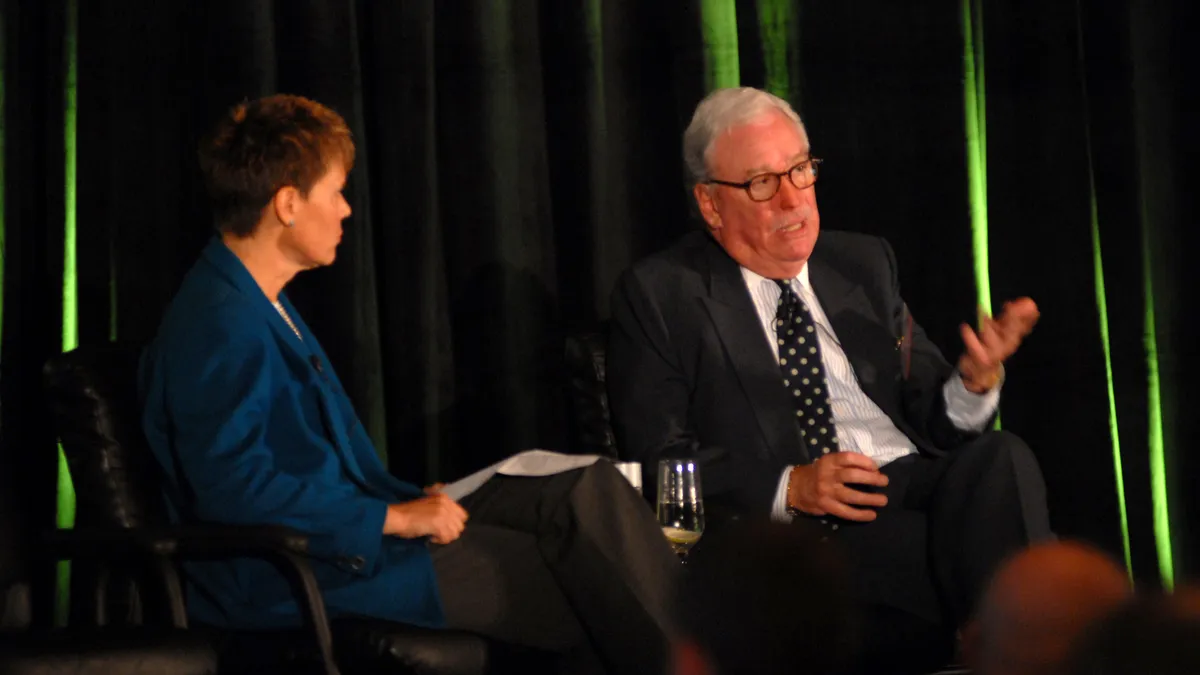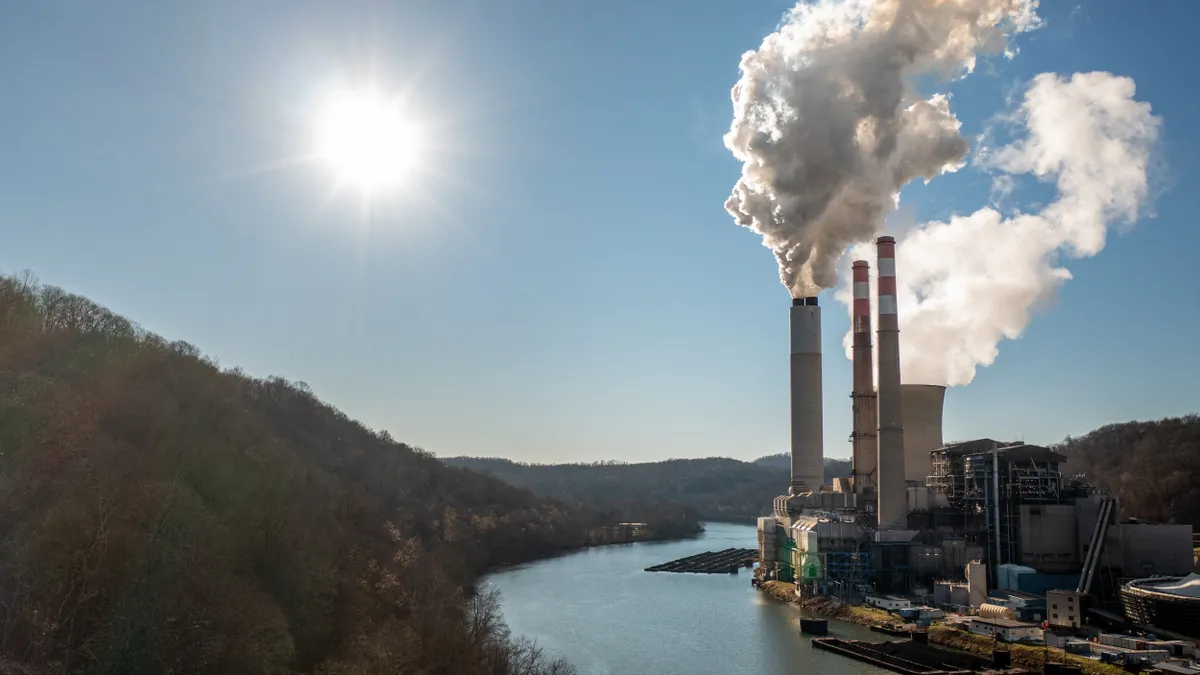When Michael Peevey steps down as president of the California Public Utilities Commission at the end of this month, he will complete of a 12-year run that witnessed the growth of distributed resources and clean energy advances, but also the San Bruno pipeline disaster and the shutdown of the San Onofre Nuclear Generating Station.
Peevey, who has served under three governors, announced his retirement from the commission in October, leaves under a cloud of controversies that have festered in the years since the San Bruno disaster. Critics say the commission has been too closely aligned with the industries it regulates, and a series of email disclosures highlighting the close relationship between an investor-owned utility and the CPUC may have sealed Peevey's fate.
"Twelve years as President is enough," Peevey said in a statement.
Peevey was appointed CPUC president by Governor Gray Davis at the end of 2002, replacing Loretta Lynch in a shakeup that had some wary — even then — of a tightening relationship between regulators and the utility industry. Peevey had been president of NewEnergy Inc until 2000, and prior to that was president of Edison International and Southern California Edison Co.
"Peevey served the California commission for more than a decade, and those are going to be big shoes to fill," said Ralph Cavanagh, co-director of the Natural Resources Defense Council's energy program.
The California commission, says Cavanagh, "may be the single most important environmental, energy regulatory body in the country, outside of Washington, D.C. … The institution is critical."
Peevey's term is set to expire on Dec. 31, and so far there has been only speculation as to who Gov. Jerry Brown will tap to take the helm. Consumer advocates are hoping for a leader more removed from industry, but they are also tempering their expectations.
"Gov. Brown has pretty much defended and supported Michael Peevey and the direction of the CPUC," said United Public Workers for Action spokesman Steve Zelter. "It's not a political change."
There may not be a tidal wave of change coming, but Cavanagh highlighted one focus he believes the next president will need. "This leader, whoever he or she is, needs to be in part inwardly-focused. That is, paying a lot of attention to the morale of the existing staff and the recruiting of new staff," he explained. "Building the institution up because so much is being demanded of it."
The scandals
In an odd twist of history, on Peevey's third day as president the commission denied a rate increase requested by Pacific Gas & Electric. He was confirmed by the California Senate on March 10, 2013, and three days later the commission rejected a $96 million request by PG&E, as well as issuing a mild rebuke to the utility for the way it addressed its rate of return.
"When a utility files for a rate increase, it is required to comply with rules that require accurate, recorded, up-to-date information," the Peevey-led commission said in a statement.
But in the years which followed, commission critics said regulators grew closer to utilities. Peevey faced criticism last year for more than $150,000 in travel gifts he accepted since 2007, and the commission's decision to stick consumers with a $3.3 billion tab for faulty San Onofre generators infuriated many.
But it was a series of emails between PG&E and the commission which ultimately ratcheted up the calls for Peevey's ouster. The utility wound up firing three executives for improper communications, and Peevey asked his chief of staff to resign, following an exchange of emails where PG&E appeared to be negotiating for a favorable administrative law judge in its rate case. The commission slapped PG&E with a $1 million fine over the emails, and federal prosecutors are now looking into the communications and the utility's relationship with regulators.
Thus far Peevey has not elaborated on his reasons for leaving, saying only he would "speak more extensively regarding my terms as CPUC president" at the commission's Dec. 18 meeting.
Dramatic change unlikely
A decision on Peevey's replacement will come by the end of the month, and could be announced to align with the commission's final voting meeting this year. While critics are hoping for a leader more focused on consumer issues, they are tempering their expectations for more modest changes.
"A large number of people in California don't trust the CPUC to properly regulate because of its connections to the industries its supposed to regulate," UPWA's Zelter said. "There's a growing anger and frustration with their failure to protect the public. … Gov. Brown is going to be appointing a replacement and he has not shown any indication that he's interested in changing."
UPWA supports consumer and labor representatives on the commission, and Zelter said "the CPUC does not really represent the public at this point."
The Utility Reform Network issued a statement saying it would like to "see as much attention paid to Main Street as is paid to Wall Street."
"The commission is obviously in need of independent leadership that can stand up to utilities rather than get in bed with them," TURN said. "The commission should give as much weight to consumer impacts as it does to financial markets."
TURN also stressed that renewable energy, energy efficiency and demand response must be cost effective. "And affordability does not have to be sacrificed for reliability. The commission must hold utilities to higher standards than it has in the past, and take its mandate to protect the public more seriously."
NRDC: Clean energy will be CPUC legacy
But if there is one thing unlikely to change at the commission, NRDC's Cavanagh said "I think the governor will pick someone who has a clear leadership record on clean energy."
The last three California governors have all been focused on renewable energy and efficiency, and "that consistent emphasis is more important in terms of the legacy of the California Public Utilities Commission than any of the short-term controversies," Cavanagh said.
As for who will actually replace Peevey, that remains a mystery. Historically California governors have interviewed the candidates themselves, so Cavanagh said that process is likely well underway.
"My experience is that public campaigns for candidates—or private campaigns—don't work well with California governors. They view this as one of the most important appointments they make. … And they are amazingly good at keeping it close until they've made a decision."
There are a lot of qualified people, including some at the commission now, who Cavanagh said could take the lead. "We don't lack for talent," he said.























